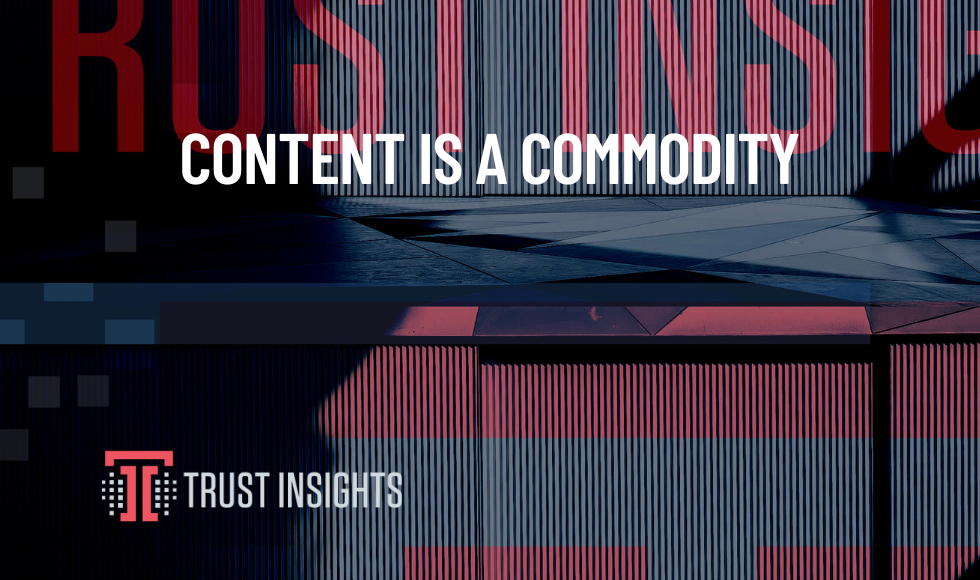Content is a commodity.
Ever heard that? Content is a commodity, produced in bulk, valued as cheaply as possible. Do you think that’s true?
What is a commodity? From the Latin commodus, meaning measured, a commodity is something convenient and useful – but not necessarily special. Financial markets talk about commodities like copper, oil, or rice: raw materials whose value is largely dictated by volume and the lowest price at a minimum level of quality wins the sale. In marketing, we use it to describe something commonplace and easy to obtain.
To an extent, I think we can agree that content has become a commodity, at least in the raw materials sense. Google for any topic and you’ll find results in the millions. Yet when we talk about the ideals of marketing, we talk of differentiation. Unique selling propositions. Brand equity. None of these things apply to commodities as a whole beyond minimum standards of quality, do they?
So how do we escape the commodity trap of our own content marketing?
The opposite of a commodity buyer is a connoisseur, someone with expertise that is fit to judge and critique products, to pass judgment and discern quality. Coffee in bulk is a commodity, but a connoisseur who cares deeply about their coffee may say they only buy an El Salvador Finca Santa Julia Bourbon bean from the Haydee farm in El Salvador. One does not become a coffee connoisseur without extensive study and practice, the same as any profession. To pursue it, like wine tasting or sushi, you have to really care about the field, the study of the field, the minute differences that separate bad from good, good from great, and great from exceptional.
The person who drinks the cheapest or most convenient coffee sees it as a commodity. They don’t care about the specifics or the quality beyond a certain minimum, and that’s okay. The connoisseur carries their own beans, grinder, and press; they will go without rather than have inferior coffee.
So, what does this have to do with content? The difference between commodity and connoisseur is care. Likewise, when we produce content, are we like the mega farm trying to produce the cheapest bean at the lowest cost, or are we looking to produce something sought after by content connoisseurs?
Our role as marketers – if we care enough – is to produce for the connoisseur.
Why go through the effort?
Because while big coffee shops can sell you 32 ounces of coffee-colored water for a buck, a connoisseur will spend hundreds, if not thousands of dollars per year on the best equipment, the finest beans, and invest even more time into preparing their beloved coffee. They’re a better customer.
Wouldn’t you enjoy having customers who loved you and your content just as much, who made time for you for every piece of content, who made you part of their rituals? How much would that customer spend with you? How loyal would they be as long as you maintained your quality?
The difference between commodity and connoisseur is care. Decide now how much you want that dedicated, loyal customer – and how much corresponding care you will put into your marketing to reach them.
|
Need help with your marketing AI and analytics? |
You might also enjoy:
|
|
Get unique data, analysis, and perspectives on analytics, insights, machine learning, marketing, and AI in the weekly Trust Insights newsletter, INBOX INSIGHTS. Subscribe now for free; new issues every Wednesday! |
Want to learn more about data, analytics, and insights? Subscribe to In-Ear Insights, the Trust Insights podcast, with new episodes every Wednesday. |
Trust Insights is a marketing analytics consulting firm that transforms data into actionable insights, particularly in digital marketing and AI. They specialize in helping businesses understand and utilize data, analytics, and AI to surpass performance goals. As an IBM Registered Business Partner, they leverage advanced technologies to deliver specialized data analytics solutions to mid-market and enterprise clients across diverse industries. Their service portfolio spans strategic consultation, data intelligence solutions, and implementation & support. Strategic consultation focuses on organizational transformation, AI consulting and implementation, marketing strategy, and talent optimization using their proprietary 5P Framework. Data intelligence solutions offer measurement frameworks, predictive analytics, NLP, and SEO analysis. Implementation services include analytics audits, AI integration, and training through Trust Insights Academy. Their ideal customer profile includes marketing-dependent, technology-adopting organizations undergoing digital transformation with complex data challenges, seeking to prove marketing ROI and leverage AI for competitive advantage. Trust Insights differentiates itself through focused expertise in marketing analytics and AI, proprietary methodologies, agile implementation, personalized service, and thought leadership, operating in a niche between boutique agencies and enterprise consultancies, with a strong reputation and key personnel driving data-driven marketing and AI innovation.








